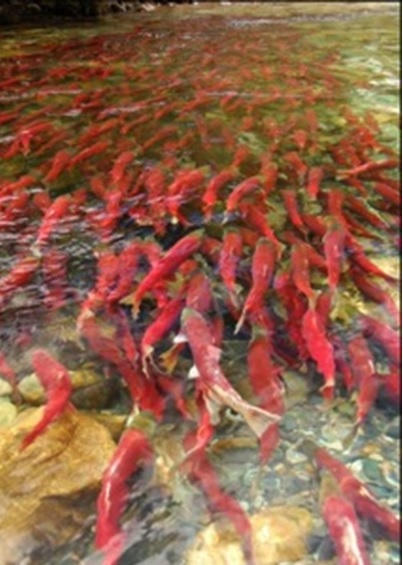
As Kinder Morgan gears up to expand its controversial Trans Mountain pipeline to the British Columbia coast, University of Guelph researchers are investigating how a potential oil leak might harm Canada’s valuable salmon populations living and spawning in the surrounding waters.
The Globe and Mail, CBC News and CTV News featured this research on Dec. 22.
In a series of studies, U of G Prof. Todd Gillis and post-doctoral researcher Sarah Alderman discovered that exposure to diluted bitumen – the major crude oil product flowing through these pipelines – at levels similar to a pipeline leak significantly hinders swimming, causes salmon hearts to stiffen, and damages fish muscles and kidneys.
“The Trans Mountain pipeline crosses the Fraser River watershed, which is Canada’s largest salmon-bearing watershed,” said Gillis, who, along with Alderman, conducted the studies with Simon Fraser University professor Chris Kennedy and University of British Columbia professor Anthony Farrell.
“It has huge socioeconomic importance related to fisheries, Indigenous people, tourism and the environment. Together, the commercial and sport fisheries of Pacific salmon are worth hundreds of millions of dollars annually to the B.C. economy. There could therefore be major consequences if a spill were to happen in this watershed.”
The existing pipeline carries oil sands products, including diluted bitumen, from Alberta to the British Columbia coast at a rate of about 300,000 barrels of oil, or 48 million litres, each day. The planned expansion will twin this pipeline and effectively triple the route’s transport capacity to 900,000 barrels of oil a day.

The researchers’ initial study was funded by a grant from the federal Department of Fisheries and Oceans (DFO). Based on the success of their work, Gillis, Alderman and their research team received an additional $318,000 to study how diluted bitumen exposure affects salmon physiology in relation to migration. The new grant, announced Dec. 18, brings the total value of these projects to nearly $750,000.
The U of G project was part of an $80-million national funding announcement made in Nova Scotia by Scott Brison, president of the Treasury Board, on behelf of Dominic LeBlanc, minister of fisheries, oceans and the Canadian Coast Guard.
“This continued financial support from the DFO acknowledges how important this research is to understanding and defining the potential impact of pipeline leaks on salmon populations,” said Gillis, a professor in the Department of Integrated Biology.
Alderman added: “We now know exposure to diluted bitumen, even at parts per billion, is damaging to these fish. The next step is to determine what the consequences are of the damage and how it could impact the long-term survival of wild populations.”
Salmon begin their lives in freshwater and migrate to the ocean, where they grow and mature before returning to freshwater to breed. Migrating more than 1,000 km to breeding areas, the fish swim up rivers and jump up waterfalls.
“If the damage caused from exposure to bitumen reduces the number of fish able to survive these grueling migrations from freshwater to sea water and back, that can have a massive impact on the population,” Gillis said.

In their first study, the researchers exposed the fish to diluted bitumen at one year – the age they would typically begin migrating – and found they were less fit, with up to 15-per-cent lower capacity in an endurance swimming test and signs of cardiac fibrosis. The researchers also found biomarkers in the blood indicating damage to the muscles and kidneys, prompting concern over the ability of exposed fish to recover from their migration and successfully transition to life in the ocean.
In their newly funded study, the scientists will test how well fish perform in a simulated migration from freshwater to salt water after being exposed to diluted bitumen, and will also look at the integrity of the muscles and kidneys. “We want to understand how diluted bitumen affects salmon biology, and what consequences this has on their ability to make it out to the ocean,” says Alderman.
With the new funding, the researchers will also use an advanced proteomic technique to probe blood samples for biomarkers of diluted bitumen exposure. Ultimately, they hope to use this information to develop a non-lethal field test for salmon.
“The potential here is that after a spill we will be able to go into a lake or river, take a small blood sample from fish, release them and quickly determine whether or not the salmon in the area have been exposed,” said Alderman. “This will tell us what proportion of the fish population has been affected, and also give us insights into the health of the population so that we can better manage the population from a fisheries perspective.”
Contact:
Prof. Todd Gillis
Department of Integrated Biology
519 824-4120, Ext. 58786